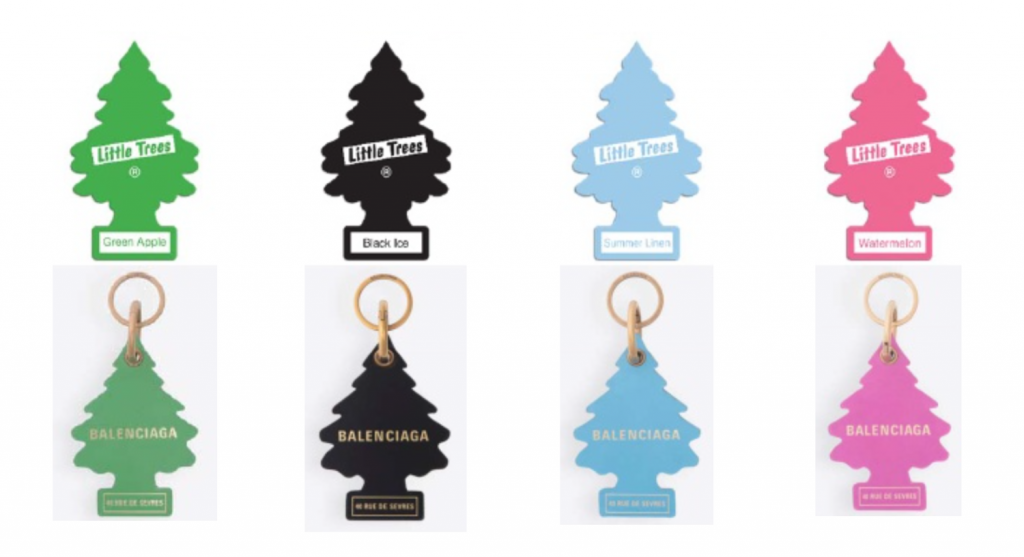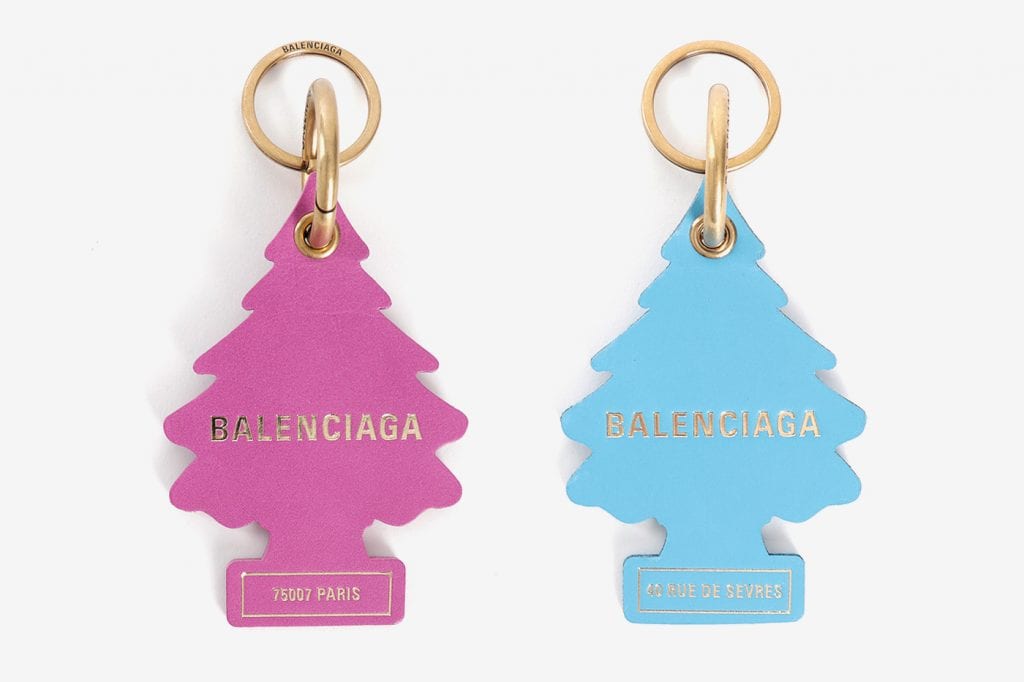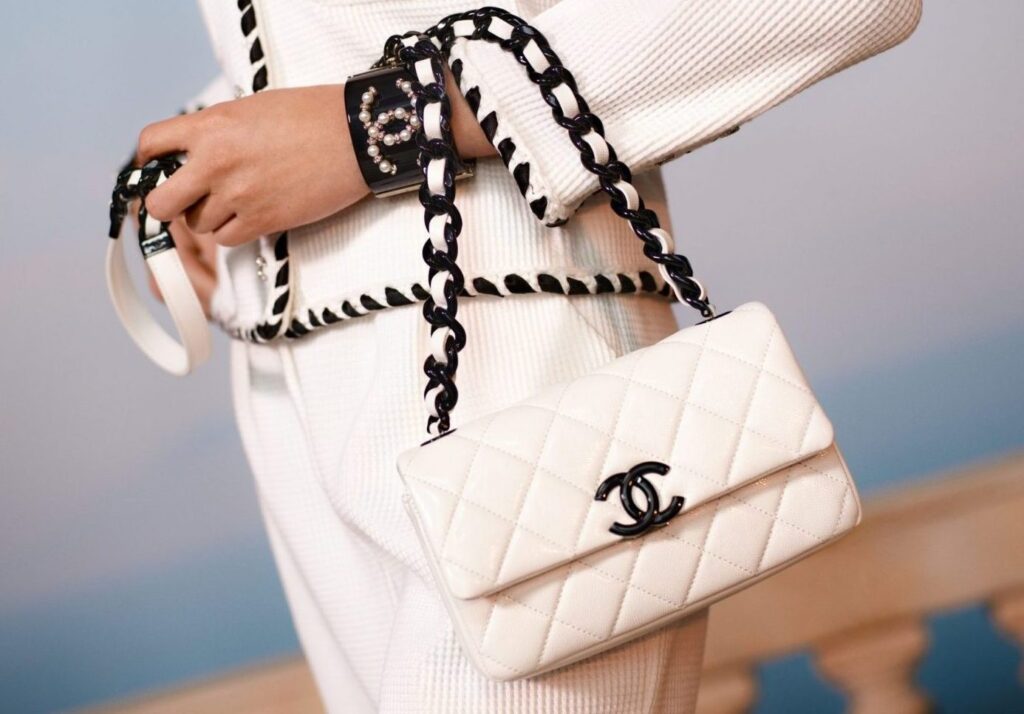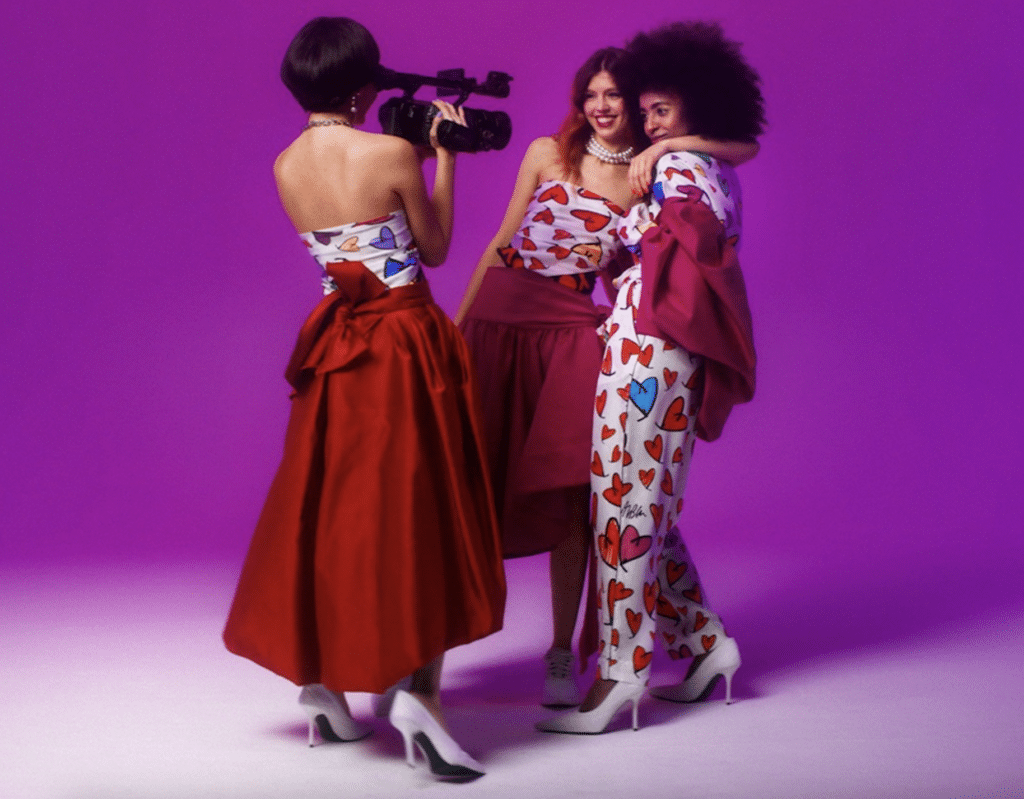Balenciaga, already in the midst of a lawsuit for allegedly copying a souvenir-inspired bag (in which creative director Demna Gvaslia was blasted for his “willingness to copy the work of others”), has been hit with yet another lawsuit. This time the Paris-based brand is on the hook for allegedly copying the world-famous CAR-FRESHNER tree design for a $275 keychain. According to a new lawsuit filed this week in a New York federal court by CAR-FRESHNER Corporation and Julius Sämann Ltd. (“the plaintiffs”), Balenciaga is selling tree-shaped keychains “that are deliberately designed to replicate the plaintiffs’ [trade dress-protected] Tree Design,” which thanks to 66 years of continuous use, have become “staples of American culture, familiar to millions of consumers who encounter these products and marks in a wide variety of commercial contexts.”
The plaintiffs allege that “Balenciaga was not only aware of Plaintiffs’ famous Tree Design Marks prior to its manufacture and distribution of the infringing products, but deliberately based its design on” the plaintiffs’ products, as indicated by the fact that that “‘Product Details’ for the infringing product leads with the statement that the infringing products represent ‘Car fresheners inspiration,’ leaving little doubt about the source of Balenciaga’s infringing design.”
Moreover, CAR-FRESHNER Corporation and Julius Sämann Ltd. argue that “the contours of the [Balenciaga design] … track exactly the shape and dimensions of a genuine LITTLETREESAir Freshener” and that “Balenciaga has even copied the specific colors associated with some of the popular scents in which the plaintiffs’ LITTLETREES Air Fresheners are offered.” Such conduct, according to the plaintiffs “is willful and intentional and betrays reckless disregard for the plaintiffs’ trademark rights.”

The plaintiffs note that while their design is best known for its use as a care air freshener, the design, itself, has been used “in connection with many additional goods that promote and benefit from association with the Tree Design Marks, including without limitation luggage tags, key rings, playing cards, greeting cards, shirts, backpacks and duffle bags, pens, stickers, umbrellas, clocks and watches, downloadable computer graphics, toys, magnets, [and] water bottles.” In fact, they assert that just recently, they “granted a license for renowned designer Anya Hindmarch to use the Tree Design Marks as the configuration of high quality hang tags for handbags, sold for hundreds of dollars.”
Such broad use of the tree design helps to bolster CAR-FRESHNER Corporation and Julius Sämann Ltd.’s claim that Balenciaga’s unauthorized use of the design “is likely to cause confusion, mistake, or deception as to the source or sponsorship of Balenciaga’s products and to mislead the public into believing that Balenciaga’s products emanate from, are approved or sponsored by, are licensed by, or are in some way associated or connected with plaintiffs.” That is the core of a trademark and/or trade dress infringement claim, which is what the plaintiffs are asserting in the case at hand (in addition to trademark dilution, a separate claim that does not require a showing of consumer confusion).
(For the uninitiated, trade dress is a type of trademark law in which the configuration of a product, such as the design, itself, or the shape, is protected as long as that design serves a source-identifying function. CAR-FRESHNER Corporation and Julius Sämann Ltd. maintain a number of federal registrations for the tree design in an array of classes of goods).
As we have noted in the past, the large-scale rise of collaborations in fashion (including with non-fashion brands), such as those put forth by Balenciaga (which has collaborated with Crocs and the World Food Programme, among others, in the past), among other high fashion brands, could, in fact, give rise to an increased likelihood of confusion. In other words, CAR-FRESHNER Corporation and Julius Sämann Ltd. very well might be able to show that consumers believe that the Balenciaga keychain is the result of a partnership with the plaintiffs, despite the obvious differences between the plaintiffs’ and Balenciaga’s core products, price points, and channels of distribution (i.e., you will not find the plaintiffs’ air freshners on Matches.com, SSSENSE, FarFetch, or Balenciaga’s e-commerce site, which is where the keychains are being sold).
As a result of the foregoing, the plaintiffs are seeking injunctive relief, which would immediately and depending on the outcome of the case, permanently, bar Balenciaga and any other entity from the “manufacture, production, sale, import, export, distribution, advertisement, promotion, display, or other exploitation of the infringing product.” CAR-FRESHNER Corporation and Julius Sämann Ltd. are also seeking an array of monetary damages, including an profits made by Balenciaga in connection with the still ongoing sale of the key chains.
* The case is CAR-FRESHNER Corporation and Julius Sämann Ltd., v. Balenciaga America, Inc., 1:18-cv-09629 (SDNY)














